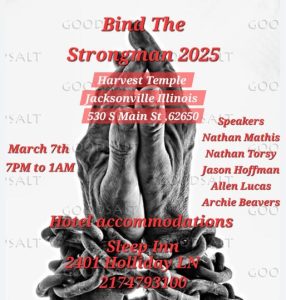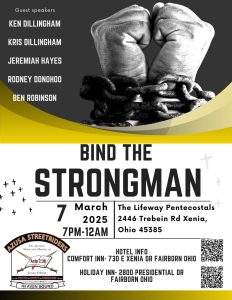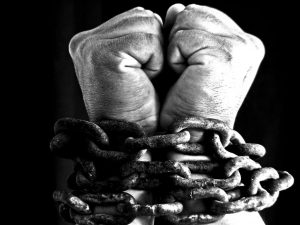Please Pray for Bro. David “POPS” Locke and Bro. Donald Brown. They were in a motorcycle accident, and they sustained injuries. Bro. Locke is currently in a Trauma Hospital in Houston, Texas. IT is reported he has multiple fractures.
Change of Venue for BTSM in Texas
Due to circumstances out of our control, the Texas Central Region Bind the Strongman location has been moved to Price, Texas.
New Life Tabernacle 3635 State Highway 42 S, Price, TX, United States, Texas Pastor Randy Hennigan.
If you were planning to attend the Baytown event, please try to make these adjustments and support this last, short-notice change.
Bind The Strongman March 7th, 2025 7:00 PM – 12:00 ish AM
We are just a month away from the annual prayer service to prepare for our riding season. I hope everyone is as excited about this event as I am. As we ended the riding season last year Azusa Street Riders members were in a spiritual attack in which several members were involved in motorcycle accidents and a couple were severe. Prayerfully we banded together in a season of fasting and prayer for our ministry and our downed riders, of which, all have overcome this attack and are on the mend. Joining with my Pastor Ken Dillingham we prayerfully sought the Lord for our theme for this year’s Bind The Strongman Prayer service. When we reflected on the unity we had during the season of attack we wanted to continue with the movement and decided our overall theme would be Spiritual Warfare. Session 1: The Armor of God and Riding Protected. Session 2: The Battle is the Lords, The Basics of Spiritual Warfare. Session 3: Enduring, Not Holding on for dear life – Holding on Until the Glory Comes. Session 4: Exercising Authority, Having a Spiritual-Led Battle Plan. Session 5: The Weapon of Worship, Leveraging the Victory of Jesus.
The locations have been selected and the planning has begun. Plan to unite with other Azusa Street Rider members across our nation as we come together in separate locations for the same purpose to show the devil that we are ready and will never back down as we prepare to spread the Gospel in the Highways and Byways and compel them to come in so that His house may be filled.



Bind the Strongman 2025 Locations

We finally confirmed all the Bind the Strong Man locations as we enter the New Year. We will be getting flyers and hotel information soon. Please be in prayer to attend and support the location nearest you to bind in unity as we prepare for the rising season and ministry outreach for 2025.
The theme for this year’s Bind The Strong Man will be Spiritual Warfare. This topic was chosen due to the attack on ASR at the end of the 2024 riding Seaon. We will bind together in prayer on March 7, 2025, to ensure the devil knows that ASR will continue to engage in Spiritual Warfare and spread the Gospel everywhere we ride.
Session 1: Armor of God (Riding Protected)
(7:00 PM – 8:00 PM)
• Scripture Focus: Ephesians 6:10–18
Session 2: The Battle is the Lord’s (The Basics of Spiritual
Warfare)
(8:00 PM – 9:00 PM)
• Scripture Focus: 2 Chronicles 20:15, Exodus 14:13–14
Session 3: Enduring (Not Holding on For Dear Life – Holding on
Until the Glory Comes)
(9:00 PM – 10:00 PM)
• Scripture Focus: Hebrews 12:1–3, Galatians 6:9
Session 4: Exercising Authority (Having a Spirit-Led Battle Plan)
(10:00 PM – 11:00 PM)
• Scripture Focus: Luke 10:19, James 4:7
Session 5: The Weapon of Worship (Leveraging the Victory of
Jesus)
(11:00 PM – Midnight)
• Scripture Focus: Psalm 149:6–9, Acts 16:25–26
Confirmed Locations:
The Lifeway Church 2446 Trebein Rd, Xenia, Oh 45324 Pastor Ken Dillingham.
The Pentecostals of Baytown 5303 N. Hwy 146, Baytown, TX 77523 Pastor Bolenbaucher
Harvest Temple 530 S. Main St, Jacksonville, IL 62650 Pastor Beavers
Life United Pentecostal Church 1301 Pipkin Road, Hinesville, Ga 31313
2025 Bind The Strongman Location

Planning is underway for the 2025 Bind The Strongman on March 7th, 2025. We pray for at least 5 locations this year to allow for a bigger attendance. As we finished out the 2024 riding season the Azusa StreetRiders Ministry was under attack with with 5 riders going down in a week time frame. 2 had significant injuries and are still recovering, and 2 totaled motorcycles, and these are the ones we are aware of. Azusa StreetRider Ministry is powerful and the Devil knows it and will do all he can to deter us from our calling and mission. We need to start 2025 with a powerful message that we will not be scared away from reaching the motorcycle community and spreading the Gospel of Jesus Christ. So I am encouraging all members to attend a location near them or commit to hosting a location for this powerful prayer service to prepare us for the riding season.
Confirmed Locations:
The Lifeway Church 2446 Trebein Rd, Xenia, Oh 45324 Pastor Ken Dillingham
The Pentecostals of Baytown 5303 N. Hwy 146, Baytown, TX 77523 Pastor Bolenbaucher
Harvest Temple 530 S. Main St, Jacksonville, IL 62650 Pastor Beavers
Tentative Locations Pending Pastoral Approval
Life Gate Church 7371 Wall Triana Hwy, Madison, AL 35757
Potential Locations
Hobart, IN. Waiting on confirmation as Bro Gunther has to talk with his Pastor.
As we continue to plan and gather information we will be posting here in the Rumblings and on the Facebook page. If you are interested in hosting a location or just want more information you can call my cell: Chaplain Scott Culver 937-572-4141 or reach out the Vice President Jeff Keck.
Winding Down the Riding Season and Preparing for Bind The Strongman
Winding Down the Riding Season and Preparing for Bind The Strongman
As the riding season is winding down, I reflect on this past year of adventures and I am reminded of Luke 14:23: “And the Lord said unto his servants, Go out into the Highways and hedges, and compel them to come in, that my house may be filled.” Having ridden almost 13, 000 miles, and 17 states, having witnessed multiple people get baptized in Jesus Name and several receive the Baptism of the Holy Ghost makes for a good riding season. This would not have been possible without the season starting in a time of prayer and a successful Bind the Strongman. With March approaching, we need to start preparing for the 2025 riding season and Bind The Strongman 2025. Our goal is to have a Bind the Strongman event in each Region to come together in a time of prayer for this ministry to grow and reach people as we ride in the Name of Jesus. Join me in prayer as we locate the locations for this year’s prayer meeting. I am hoping to have multiple locations to allow for the opportunity for everyone to attend this powerful event. Contact Vice President Jeff Keck and Chaplain Scott Culver, if you are interested in hosting the 2025, Bind the Strongman Event so we can get the locations set promptly to allow for maximum attendance.
Righteous Judgement
John 7:24 Do not judge according to appearance, but judge with righteous judgement.
As I reflect on June, the events we have been to, and the 2500 miles over 9 states we have ridden, I know what we were doing and how we were presenting ourselves, but what did other people think? Being an Addiction Counselor, when I see people standing on the street corner my first thought is that they are looking to buy drugs, as this is a common way for people to get drug money. I am always convicted with that thought.
It is easy to jump to conclusions about someone based on their outward appearance. However, this is something that we learn not something we are born with.
Nelson Mandela once said,
“No one is born hating another person because of the color of his skin, or his background, or his religion. People must learn to hate, and if they can learn to hate, they can be taught to love, for love comes more naturally to the human heart than its opposite.”
Jesus did not judge people based on their outward appearance. Others were amazed and intrigued at the kinds of people Jesus chose to befriend.
That’s true for us today too. Jesus has never been one to build a clique from the most famous, most popular and most beautiful. He accepts all who open their hearts to Him. We’re a motley crew, however, with His power within us, we can change the world.
This verse (John 7:24) is part of a challenge Jesus made to the religious leaders of Jerusalem. Jesus was teaching that people should not be superficial when evaluating others, but instead should judge based on what is right. This means examining people’s heart, motives, and lives rather than making judgements based on appearances. Jesus believed that to judge rightly his audience needed to know God and have faith in Him. He believed that if they did, they would understand who Jesus was and their evaluation of the situation would be different.
Prayer: Lord, forgive me for the constant judgements I make of others. Give me Your eyes, so that I may look at people’s hearts, not their outward appearance. Amen.
Who have you judged harshly?
Always Keeping Ready for the Mission
The riding season is upon us. We have our rides planned and our bike serviced road ready. Our mission is clear and the purpose is to “Go out into the highways and hedges, and compel them to come in, that my house may be filled” Luke 14:23. I want to take this moment to remind each one of us to seek God to:
- Let us always be ready to share our testimony and His Word II Timothy 4:2
- Keep our attitude Christ-like Ephesians 4:2-5
- Protect us and those around us Ephesians 5:15-17
- Give us alertness and quick thinking on the roads Proverbs 3:23-26
- Bring us back to our family with a grateful heart for the blessings of the day Psalm 121:8
Bind The Strong Man 2025
Every event takes time to plan in all areas. What will be done, where will we go, what to we eat, do we ride or drive. Every year planning doesn’t start until after the National Rally. Since this time of prayer is an important aspect of preparing for the riding season I have been asking myself Why? Why do we wait until last minute to plan for this important event of the season. Why do we only have four location? Why do we limit some areas for being too far to travel to attend. . I would like to change that moving forward. I would like to start the planning process by asking the question of who would like to host a location for a Bind the Strongman Event for 2025. My goal is to have 2025 Bind the Strong location set by the National Rally this year. If your chapter is interested in being a Host Location for the Bind The Strongman Prayer service 2025 please contact me so I can generate a list of potential location. My thought is that with more time to plan we can make 2025 Bind The Strongman with multiple locations and the biggest turn out in the history of the event. Please contact me by any of the following means to let me know if you would like to be a host location.
Scott E. Culver
International Chaplain
937-572-4141
Harleydoc64@gmai.com
Docnstitchembroidery@gmail.com
Bind The Strongman is Finally Here.
As we prepare to meet for our annual prayer meeting I want to encourage everyone to attend one of the 4 locations. I did not always attend Bind the Strong Man for some reason or another, so I understand if you have thoughts of not attending. But when I started to attend every year I found that I am blessed beyond measure and God has opened doors that I could never have accomplished by myself. Bind the Strongman has been a big part of me growing closer to God and building my ministry. For where two or three gather together in my name, there I am in the midst of them, Mathew 18:20. I have never felt this to be more true then when I started to attend Bind the Strongman and pray with a purpose with other riders. As we prepare our hearts and minds for the rising season. God blesses us by keeping us safe on the road and placing us in the right place at the right times.
Lord God, I pray today that you guide us as we ask you into our presence to prepare us for the riding season and whatever ministry opportunity that you may have for us this year. Prepare our hearts and minds and give us a burden for the lost motorcyclist. Lord, I pray that you place a hedge of protection on all as we drive to our respective locations so that we arrive safe. Lord, I pray that You anoint the speakers at each location so that we may hear the word that You have for us all. In Jesus Name, I pray.
